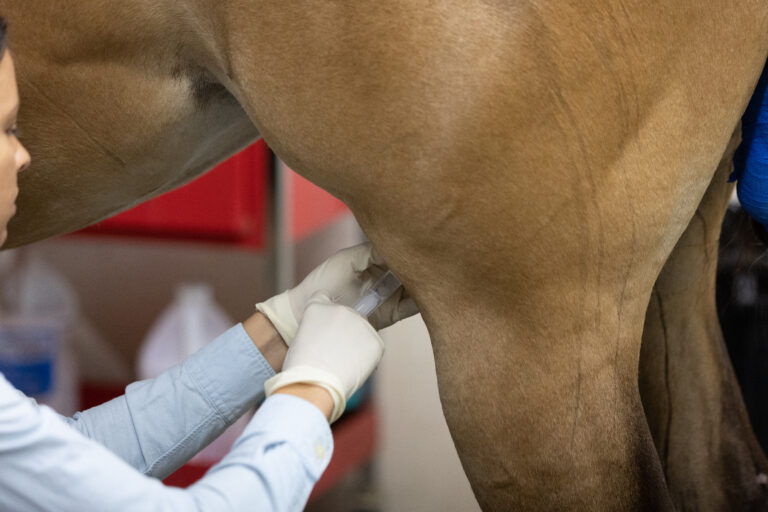
Flumetasone (aka flumethasone) is a powerful corticosteroid often used to mitigate inflammation following strenuous exercise. It is reportedly used in racehorses in some racing jurisdictions. In a 2019 study, University of California, Davis, researchers aimed to describe its pharmacokinetics and effects on cortisol and eicosanoid serum concentrations with the ultimate goal of “facilitating regulatory bodies to appropriately regulate the use of flumetasone in performance horses” via urine sampling.
Research on Flumetasone in Horses
The research team administered a flumetasone dose of 5 milligrams intravenously to 12 healthy, exercised Thoroughbred horses aged 4-7 years. They obtained blood samples before administration and at frequent periodic intervals over the following 72 hours. They also collected urine just prior to administering the drug and 24, 48, and 72 hours following. A challenge with lipopolysaccharide (LPS), calcium ionophore, or methanol was used to elicit synthesis of eicosanoids, such as prostaglandin and leukotrienes—these enable innate immunologic cells to rapidly respond to bacteria and help induce swelling and inflammation at injury sites. Cell membrane damage, such as results with a performance-associated injury, results in eicosanoid production.
The scientists evaluated the blood and urine samples for concentrations of a) flumetasone; b) hydrocortisone; c) inflammatory biomarkers; and d) eicosanoids ex vivo stimulated by LPS. The study results showed that flumetasone clears rapidly from the system with a short elimination half-life, resulting in a brief period to detect it in blood. As with other exogenous corticosteroids that decrease endogenous hydrocortisone production (e.g., triamcinolone (TA) and dexamethasone), flumetasone rapidly suppresses hydrocortisone concentration by at least two hours following dosing. The maximum suppression of hydrocortisone occurs at 13 +/- 8 hours, whereas TA and dexamethasone maximally suppress at 25 +/- 7.5 and 20 +/- 2.7 hours, respectively.
Research Findings
By 36 hours post-administration, flumetasone fell below the limit of quantitation (LOQ or detectability) yet hydrocortisone concentrations were significantly decreased below baseline levels. Hydrocortisone production was suppressed for up to 72 hours, which was the final sampling point in the study despite flumetasone no longer being detectable in the serum. With potent suppression of the adrenal gland, flumetasone acts as a powerful anti-inflammatory therapeutic agent for horses. Eicosanoids also were decreased for at least 36 hours, lasting beyond flumetasone’s point of detection in serum. The authors suggested that “although the elimination half-life and detection time in blood are similar for flumetasone and triamcinolone, flumetasone may have a longer duration of anti-inflammatory effect compared to TA.”
Final Thoughts
In summary, “Flumetasone is rapidly cleared from blood following administration to horses. It is a potent anti-inflammatory with prolonged effects on production of cortisol and other inflammatory mediators,” the study authors reported.
Reference
Knych HK, Arthur RM, McKemie DS, et al. Pharmacokinetics of intravenous flumetasone and effects on plasma hydrocortisone concentrations and inflammatory mediators in the horse. Equine Veterinary Journal 2019, vol. 51; pp. 238-245; DOI: 10.1111/evj.13002
Related Reading
Stay in the know! Sign up for EquiManagement’s FREE weekly newsletters to get the latest equine research, disease alerts, and vet practice updates delivered straight to your inbox.




